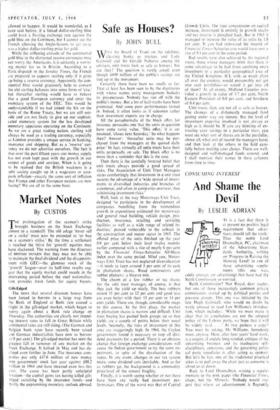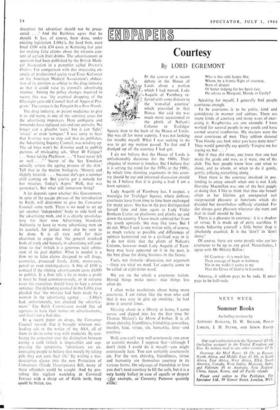And Shame the Devil
CONSUMING INTEREST By LESLIE ADRIAN
Reith Commission? Not Royal, dear reader, but one of those increasingly common private commissions started up by political parties and pressure eroups. This one was initiated by the late Huth Gaitskell, who would no doubt be wryly amused to read Len Williams's introduc- tion, which includes: 'While we must make it clear that its conclusions are not the adopted policy of the Labour party, we hope that it will be widely read. . . .' At two guineas a copy') You must be joking, Mr Williams. Somebody must, anyway. Here, after four years' hard work, is a cogent, if unduly long-winded, critique of the advertising business and its inadequate self- disciplinary apparatus, and the governing politi- cal party repudiates it. after acting as sponsor. But let's be fair, one of the traditional practical jokes is to pull away the chair just as someone is about to sit down.
Back to Lord Drumalbyn, writing a supple- mentary to the pink paper (the Financial Times, chaps, not the Mirror): 'Nobody would sug- gest that where an advertisement is flagrantly deceptive the advertiser should not be prose- cuted. . . .' And the Reithites agree that he should. It has, of course, been done, under existing legislation. Libby's, the food firm, were fined £100 with £34 costs at Kettering last year for making false claims about the vitamin con- tent of certain fruit drinks. The advertisement in question had been published by the Briti,h Medi- cal Association in a pamphlet called Doctor's Orders. For comparison with this interesting ex- ample of professional cecity read Estes Kefauver on the American Medical Association's abdica- tion of its position as arbiter to the drug industry so that it could raise its journal's advertising revenue. Among the policy changes required to secure this was 'the eventual dropping of the fifty-eight-year-old Council Seal of Appoval Pro- gram.' The source is the Penguin In a Rew Hands.
The drug industry, or patent medicines to give it its old name, is one of the sensitive areas for the advertising improvers. Here ambiguity and innuendo have replaced out-and-out untruths. No longer can a placebo 'cure,' but it can 'fight,' 'attack' or even 'conquer.' I was sorry to hear that Scrutiny was to stop and that its publisher, the Advertising Inquiry Council, was winding up. The ad boys won't be. Scrutiny used to publish pictures of misleading ads. 'Over 40 Fatigue? . . . Since taking Phyllosan ... "I have never felt so well . . ." "Secret of the Sea Emulsion actually arrests the ageing process of the skin.' Tell that to the marine biologists. 'Shivery and slightly feverish . . . because she's got a summer chill coming on. But you've got a remedy for her miseries. Today's Aspro.' Well, that was yesterday's. But what will tomorrow bring?
A lot depends upon whether this Government, in spite of the escape phrases of the introduction to Reith, will determine to give the Consumer Council some teeth. There is no need to set up yet another 'independent' body to ride herd on the advertising mob, and it is clearly unsatisfac- tory for their own Advertising Standards Authority to have so many advertising men on its council, for justice must also be seen to be done. It is all very well for their chairman to argue that 'the general standard both of truth and honesty in advertising will con- tinue to rise' (which is a generous tacit admis- sion of its past depths). What is needed is a firm No to false claims designed to sell drugs, cosmetics, processed foods, drink, motor-cars, petrol or even rocking-chairs. A fine of £100 is comical if the sinning advertisement costs £4,000 to publish. If a firm tells a lie to make a profit it must be fined commensurately, or in extreme cases the executives should have to face a prison sentence. The defending counsel in the Libby case pleaded that 'the mistake had been made by a woman in the advertising agency . . Libby's had, unfortunately, not checked the advertise- ment.' The Reith Commission would like ad agencies to have their names on advertisements, and that's not a bad idea.
In a recent paper on drugs, the Consumer Council records that it brought nineteen mis- leading ads to the notice of the ASA, all of them to do in some way with medicine. By con- fusing the consumer over the distinction between curing a cold (which is impossible) and sup- pressing the symptoms, 'advertisers are en- couraging people to believe that merely by taking pills they can cure their ills.' By writing a mis- description clause into the new Protection of Consumers (Trade Descriptions) Bill, many of these offenders could be caught. And by pro- viding this vigilant watchdog in Cornwall Terrace with a sharp set of Reith teeth, they could be bitten, too.































 Previous page
Previous page